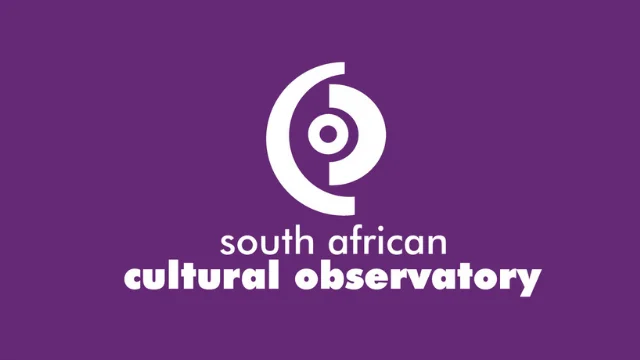
By Poelo Irene Keta
On 31 March 2022, the South African Cultural Observatory (SACO) released its 2022 Economic Mapping Report of the Cultural and Creative Industries to a worldwide audience. This is the first comprehensive study of the contribution of the cultural and creative sector to the economy in the post COVID-19 environment.
Established in 2011, SACO is a national statistical and socio-economic research project funded by the Department of Sport, Arts & Culture to develop a comprehensive cultural information system in South Africa. It is hosted by and based at Nelson Mandela University, in partnership with Rhodes University, the University of Fort Hare, and the University of KwaZulu-Natal. SACO's latest Bi-Annual Mapping Study Report shed light on the harsh effect the COVID-19 pandemic has had on South Africa's Cultural and Creative Industries (CCIs) and the country's economy.
Executive Director of SACO, Ms Unathi Lutshaba, who also leads the cohort of the four institutions involved with SACO in this project, praised her colleagues who worked tirelessly on updating the previous mapping studies published by SACO in 2018 and 2020, respectively.
Also attending the event was the Minister of Sport, Arts and Culture, Mr Nathi Mthethwa, who gave his address before the report's release. Mthethwa praised SACO for its maturity and timely delivery of accurate and policy-relevant statistics needed in today's complex and rapidly changing social, political and economic environments. "This report is one of the first ground-breaking studies to look at the immediate impact of the COVID-19 pandemic on the cultural and creative sector in general, and creative practitioners in particular," he said.
A particular focus of the 2022 mapping study is the impact of the COVID-19 pandemic on different parts of the sector, adaptation strategies used, and tracking of the start of the recovery as lockdown regulations eased. Despite the difficulties brought on by the pandemic, South Africa continues to struggle with unemployment, and these cultural and creative industries have historically worked harmoniously to help with job creation, especially amongst the youth. "As different art forms have developed, they have become distinct industries, each with considerable economic value, being part of a value chain of cultural production and creating jobs in today's world," Mthethwa said. In his closing remarks, he emphasised the importance of establishing healthier and more resilient cultural spaces, especially in our post COVID-19 reality.
After the Minister's encouraging address, the research team involved in the project expanded on the report. The core researchers for this project included the following interdisciplinary team members, led by the Rhodes University Economics Department: Jen Snowball, Professor of Economics at Rhodes University, Project Manager and Cultural Economist; Dr Andre Gouws, Independent Economist and the team's lead Macroeconomic Model Builder; Prof Mike Burton, Mathematical Modelling Specialist (Rhodes University); Mr Serge Hadisi, Rhodes University alumni and Labour Market Specialist; Prof Mike Rogan, Labour Market Specialist (Rhodes University); and Ms Niki Cattaneo, International Trade Specialist (Rhodes University).
Andre Gouws, the team's lead macroeconomic model builder, began the presentation by demonstrating the significance of CCIs to the South African economy. "CCIs make up almost 3% of South Africa's economy. It's almost the size of agriculture, and I think we can work hard and get cultural tourism going again, now that the COVID-19 pandemic seems to be over," he explained. He spoke about the unfortunate decline of the production and sale of non-durable goods such as magazines and newspapers due to the emergence of eBooks and technology such as e-readers and how they were particularly hard hit due to the pandemic.
After a comprehensive look through some of the figures in the report, Gouws handed over to Mr Sinethemba Vitshima from SACO, who addressed the significant and positive impact that these industries have had on employment and transformation. As seen in the latest report, which can be fully downloaded from SACO's website, overall, the creative economy accounted for 6% of all jobs in South Africa, which translates into just under 1 million jobs. "This was a slight increase from 2017 when the creative economy made up 5.9% of all jobs (approximately 965 000 jobs)," Vitshima explained. These results are estimates, but they show that the creative economy in South Africa makes a significant contribution to employment.
Other SACO researchers who worked on the maping study included Mr Thembela Xhoxho (SACO), who presented the section on International Trade of Cultural Goods and Services, and Mrs Marlene Scharf (SACO) who assisted with bibliographic research. In attendance at the was also the Director-General of the Department of Sport, Arts and Culture, Mr Vusumusi Mkhize.
This report concludes that, although there is overall evidence that South Africa's creative economy has been negatively affected by COVID-19 containment measures, it continues to contribute significantly to South Africa's GDP, job creation and transformation agendas.
The report also acknowledged the hardworking Rhodes University postgraduate students who contributed to the project as interns, Mr Ayabonga Qhubani (Economics Honours Student), Ms Mitchelle Makokove (Economics Honours Student), Ms Nandipha Fumbatha (Economics PhD Student), and Ms Nqobile Nzimande (Economics PhD Student).
